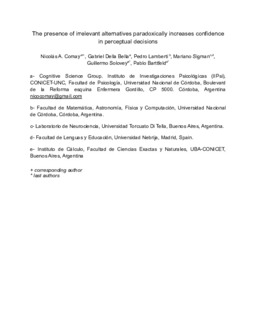Mostrar el registro sencillo del ítem
The presence of irrelevant alternatives paradoxically increases confidence in perceptual decisions
| dc.rights.license | https://creativecommons.org/licenses/by-sa/2.5/ar/ | es_AR |
| dc.contributor.author | Sigman, Mariano | es_AR |
| dc.contributor.author | Comay, Nicolás | es_AR |
| dc.contributor.author | Della Bella, Gabriel | es_AR |
| dc.contributor.author | Lamberti, Pedro | es_AR |
| dc.contributor.author | Solovey, Guillermo | es_AR |
| dc.contributor.author | Barttfeld, Pablo | es_AR |
| dc.date.accessioned | 2023-06-16T22:13:51Z | |
| dc.date.available | 2023-06-16T22:13:51Z | |
| dc.date.issued | 2023 | |
| dc.identifier.uri | https://repositorio.utdt.edu/handle/20.500.13098/11886 | |
| dc.identifier.uri | https://doi.org/10.1016/j.cognition.2023.105377 | |
| dc.description.abstract | Confidence in perceptual decisions is thought to reflect the probability of being correct. According to this view, confidence should be unaffected or minimally reduced by the presence of irrelevant alternatives. To test this prediction, we designed five experiments. In Experiment 1, participants had to identify the largest geometrical shape among two or three alternatives. In the three-alternative condition, one of the shapes was much smaller than the other two, being a clearly incorrect option. Counter-intuitively, confidence was higher when the irrelevant alternative was present, evidencing that confidence construction is more complex than previously thought. Four computational models were tested, only one of them accounting for the results. This model predicts that confidence increases monotonically with the number of irrelevant alternatives, a prediction we tested in Experiment 2. In Experiment 3, we evaluated whether this effect replicated in a categorical task, but we did not find supporting evidence. Experiments 4 and 5 allowed us to discard stimuli presentation time as a factor driving the effect. Our findings suggest that confidence models cannot ignore the effect of multiple, possibly irrelevant alternatives to build a thorough understanding of confidence. | es_AR |
| dc.description.sponsorship | Este documento es una versión del artículo que se encuentra publicado en Cognition, 234, 105377 | es_AR |
| dc.format.extent | 42 p. | es_AR |
| dc.format.medium | application/pdf | es_AR |
| dc.language | eng | es_AR |
| dc.publisher | Cognition | es_AR |
| dc.relation.isversionof | Comay, N. A., Della Bella, G., Lamberti, P., Sigman, M., Solovey, G., & Barttfeld, P. (2023). The presence of irrelevant alternatives paradoxically increases confidence in perceptual decisions. Cognition, 234, 105377. https://doi.org/10.1016/j.cognition.2023.105377 | |
| dc.rights | info:eu-repo/semantics/openAccess | es_AR |
| dc.subject | Confidence | es_AR |
| dc.subject | Perceptual | es_AR |
| dc.subject | Decision making | es_AR |
| dc.subject | Multiple alternatives | es_AR |
| dc.subject | Bayesian confidence hypothesis | es_AR |
| dc.subject | Computational modeling | es_AR |
| dc.subject | Open data | es_AR |
| dc.title | The presence of irrelevant alternatives paradoxically increases confidence in perceptual decisions | es_AR |
| dc.type | info:eu-repo/semantics/preprint | es_AR |
| dc.type.version | info:eu-repo/semantics/submittedVersion | es_AR |

